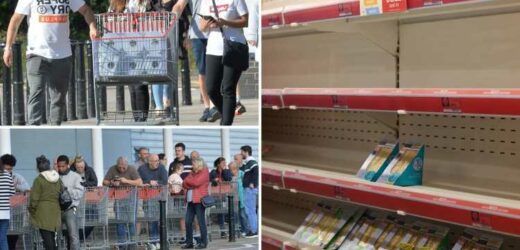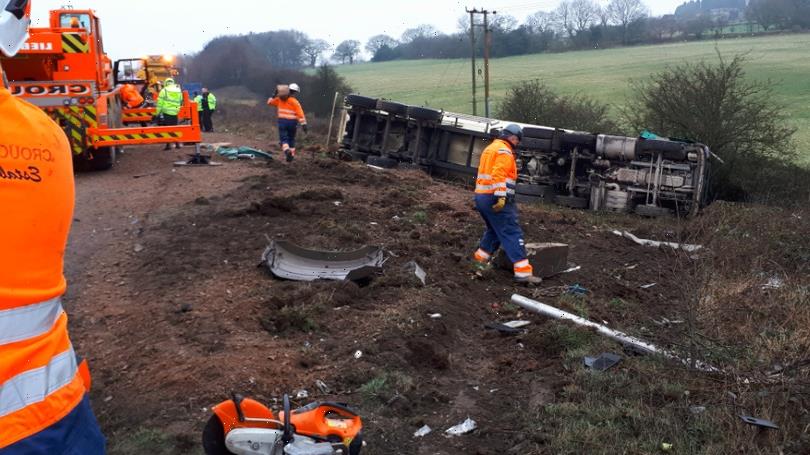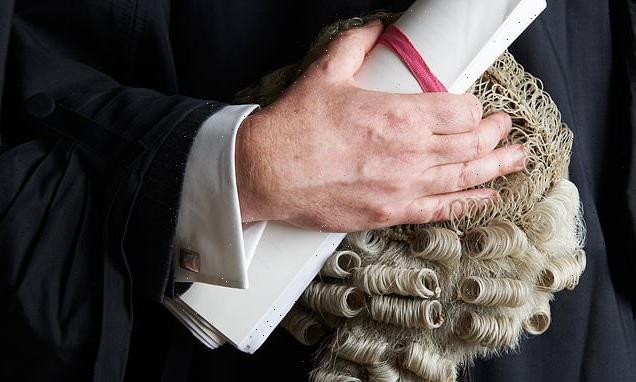HEINZ'S boss has warned Brits to get used to higher food prices as panic buyers continue stripping shelves bare and one-third of lorries on our roads are empty.
Miguel Patricio admitted the firm is "raising the prices" of products including ketchup and baked beans.
Although he didn't reveal how much prices would increase by, he blamed rocketing costs on a lack of truck drivers in the UK.
Patricio also told BBC News that consumers will have to get used to spending more for food due to the world's rising population, and a lack of land to grow produce on.
But he urged firms to take on spiralling costs, adding: "I think it's up to us and to the industry and to the other companies to try to minimise these price increases."
When asked to explain why the rises were occurring, Patricio said: "Specifically in the UK, [it is due to] the lack of truck drivers.
"In (the) US, logistic costs also increased substantially, and there's a shortage of labour in certain areas of the economy."
It was also because inflation was "across the board" unlike in previous years, he added.
Kona Haque, head of research at the agricultural commodities firm ED&F Man, told the broadcaster: "Whether it's corn, sugar, coffee, soybeans, palm oil, you name it, all of these basic food commodities have been rising."
It comes amid fears over supply chain issues ahead of Christmas.
Business advisory firm BDO LLP said its research suggested that economic growth had slowed for five months in a row due to disruption.
PM Boris Johnson has refused to rule out shortages at Christmas while Chancellor Rishi Sunak said distribution problems with some key goods could continue for months.
Photographers have taken pics of empty shelves, particularly across London as people panic-buy as a result of the confusion.
The Mirror reported that supplies of milk, bread, sandwiches and fizzy drinks have been low in certain stores across the capital.
LOW ON LOO ROLL
Frantic shoppers were seen pushing trolleys laden with toilet roll and water bottles as the festive rush appeared to have started weeks early.
According to the Office for National Statistics, one in six people has been unable to buy essential food items in the past fortnight.
A survey by The Grocer found that a third of people had started stocking up on Christmas food and drink or were planning to by the end of October.
Two-thirds of Brits said they were concerned about the shortages over the festive period.
Meanwhile, loo roll stocks could be under threat again in weeks as the paper and food packaging are among the items that could be hit hardest — sparking fears of panic buying similar to that seen during the Covid pandemic.
Manufacturers warned they would have no choice but to restrict production to protect their finances as gas and electric prices rocket.
Andrew Large, director-general at the Confederation of Paper Industries, said its members are being “affected very, very severely” by cost increases — and called for an energy price cap for firms to help see them through the winter.
He said: “They’re seeing their costs go up through the roof. It’s damaging their profitability and in some cases, it’s causing them to manage their production rates so as not to expose themselves to the very, very highest costs.”
It comes as Boris Johnson conceded the country's delivery crisis could last months.
Last Sunday the PM said he agreed with Rishi Sunak that the chaos could stretch into the festive period.
The Chancellor has warned the shortages "are very real" and that "we're seeing real disruptions in supply chains in different sectors".
HAULAGE WOES
Meanwhile, the shortage of HGV drivers is being plugged with bus drivers, attracted by higher wages.
Drivers earning an average of £32,500 a year are being lured by the prospect of up to £78,000 behind the wheel of a lorry.
Some key bus routes have already been axed and the number of journeys reduced.
Angry operators blame road haulage bosses for poaching their drivers and warned they needed 4,000 recruits to keep bus fleets moving.
Britain's roads could become icy death traps this winter as councils face a shortage of gritter drivers.
Ministers have stepped up their drive to beat the trucker shortage by creating an extra 2,000 fast-track driver courses.
Over 55,000 domestic drivers left the industry during the last 18 months, reported the Grocer. Retirement, a lack of driving tests during Covid, and tax changes have all been cited as the cause.
Nearly a million letters have been sent out asking HGV licence-holders who have left the industry and including bus drivers, to return.
Despite Government efforts, increasing economic costs threaten to eat up higher wages predicted by Johnson.
The price of unleaded petrol rose by 23p a litre to £1.36 last week, adding £11.40 to the cost of a full tank for a family car.
It means a typical motorist clocking up the average distance will pay an extra £191 to fill up over the next year, according to analysis by Labour.
And, in a further blow to the PM’s levelling-up agenda, a new study showed house price rises outstripped wages in four out of ten areas.
In the hardest-hit parts of the North, Midlands and seaside towns, properties have earned double or triple what residents earn from going to work.
Labour claimed it was pushing affordable home ownership out of reach of first-time buyers.
Shadow Housing Secretary Lucy Powell said: “The link between hard work and getting on the housing ladder has been broken for local people who want to put down roots in the community where they grew up.”
Source: Read Full Article





